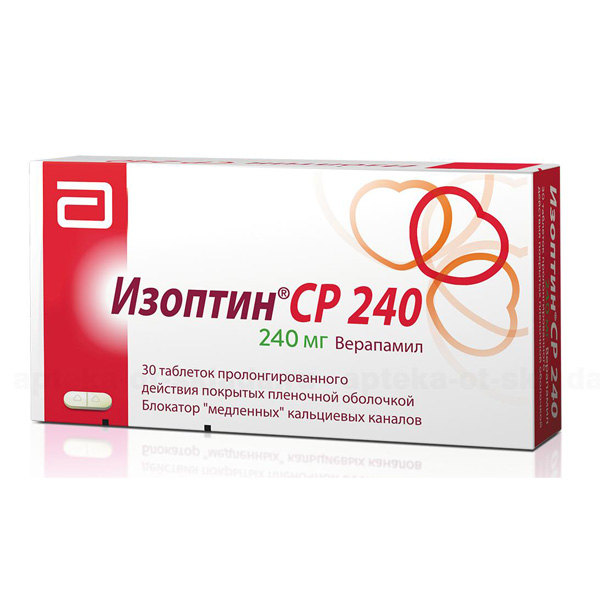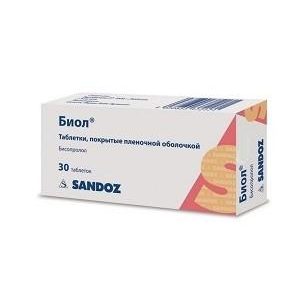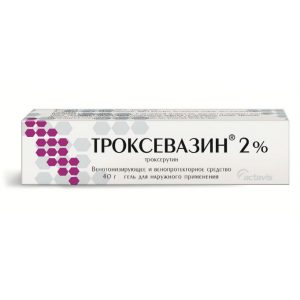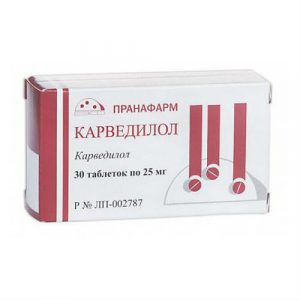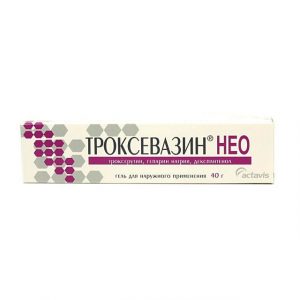Description
Release form
Sustained-release film-coated tablets.
Packing
30 pcs.
Indications
arterial hypertension
chronic stable angina (angina pectoris)
angina due to vasospasm (Prinzmetal angina, variant)
paroxysmal supraventricular tachycardia srd accompanied by tachyarrhythmia (with the exception of WPW syndrome).
Contraindications
severe cardiac arrhythmias
cardiac arrhythmias
severe chronic heart failure
hypersensitivity to the drug Isoptin SR 240.
Use during pregnancy and lactation
with caution .
Special instructions
Isoptin SR 240 is prescribed with caution in case of AV block I degree (bradycardia less than 50 beats per minute), hypotension, (SBP below 90 mm Hg), flickering, atrial flutter, while there is a syndrome of premature ventricular excitation, heart failure (before treatment, it is necessary to compensate for the condition, for example, cardiac glycosides). It should not be combined with iv administration of beta-blockers.
Composition
1 sustained-release tablet film-coated tablet contains:
active substance: 240 mg verapamil hydrochloride.
The active substance is embedded in the hydrocolloid matrix of alginate, a natural polysaccharide. The rate of release is determined by diffusion and surface erosion. Upon contact with the liquid contents of the intestine, the tablet surface swells to form a gel-like diffusion layer. Specially included surface defects cause uniform gel erosion, and therefore provide almost constant diffusion characteristics. The combination of these two mechanisms makes it possible to control the release of the active substance with almost zero order kinetics over a period of about seven hours.
excipients: microcrystalline cellulose, sodium alginate, povidone (constant K = 30), magnesium stearate, purified water, hypromellose, macrogol 400, macrogol 6000, talc, titanium dioxide, quinoline yellow, indigotine, mountain glycol wax.
Dosage and administration of
Isoptin CP 240 is taken orally, without chewing, during or after meals, with a small amount of liquid, 240-360 mg (dose is selected individually). With prolonged therapy, the daily dose of Isoptin CP 240 should not exceed 480 mg. Usually prescribed in the morning at 240 mg. If a slow decrease in blood pressure is desired, 120 mg is prescribed.
Side effects
Sinus bradycardia, sinoatrial block, asystole, AV block, bradycardia, hypotension, heart failure, dizziness, headache, weakness, lethargy, irritability, paresthesia, nausea, constipation, allergies, allergies, arteria, allergies, arthralgia.
Overdose
Symptoms of poisoning as a result of an overdose of the drug Isoptin SR 240 depend on the amount taken, the time of detoxification and myocardial contractility, depending on age. Fatal cases resulting from an overdose have been reported.
Symptoms: a drop in blood pressure (in some cases, to levels that cannot be measured), shock, loss of consciousness, AV block of I or II degree, often in the form of Wenckebach periods with or without slipping rhythm, complete AV block with full AV dissociation, slipping rhythm, cardiac arrest, sinus bradycardia, and sinus node arrest.
In case of an overdose of Isoptin CP 240, it must be borne in mind that the active substance is released and absorbed from the intestine within 48 hours after ingestion. Depending on the time of taking the drug, individual conglomerates of the remnants of the swollen tablets, acting as active depots, will be located throughout the digestive tract.
Treatment: measures aimed at removing the drug are indicated (for example, induce vomiting, rinse the stomach and intestines in combination with an endoscopic examination, prescribe laxatives, emetics). If there is no motility of the stomach and intestines (signs of peristalsis during auscultation), then it is advisable to wash the stomach even 12 hours after taking the drug inside. Common emergency resuscitation measures include indoor heart massage, artificial respiration, and electrical stimulation of the heart.
The effects associated with inhibition of cardiac function, arterial hypotension, and bradycardia should be excluded.
Calcium is a specific antidote: 10-30 ml of a 10% solution of calcium gluconate is administered as an intravenous infusion (2.25-4.5 mmol), and if necessary, is administered repeatedly or as a slow drop infusion (5 mmol / h).
In the case of AV blockade of the II or III degree, sinus bradycardia, cardiac arrest, the administration of atropine, isoprenaline, orciprenaline, and cardiac stimulation is indicated.
In case of arterial hypotension, dopamine, dobutamine, norepinephrine (norepinephrine) are administered.
In case of persistent signs of myocardial insufficiency, dopamine, dobutamine are administered, if necessary, additional calcium is administered.
Storage Conditions
The product should be stored in a dry, dark place at a temperature not exceeding 20 ° C.
Active ingredient
Verapamil
Conditions of supply of pharmacies
prescription
Dosage form
tablet prolong.
